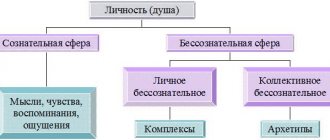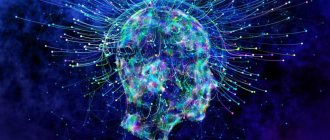Greetings, friends!
Not all people correctly understand what self-awareness is, despite the fact that this word is familiar to every person, and many use it in a variety of senses. In psychology, this term describes the totality of a person’s ideas about himself, his physical body, his psyche, his current state and how he looks from the outside. Self-awareness is formed in childhood, when the child begins to think about how others perceive him and the actions he performs. Today we will analyze in detail what self-awareness is, how it is formed and how it works.
What is self-awareness
What does self-awareness mean? This can be literally translated as “knowing oneself” or “knowing oneself.” The term comes from philosophy. It is no longer possible to say exactly who introduced this concept, but in psychology it is associated with the name of L.S. Vygotsky. This is what the author calls knowledge about himself: “a person’s awareness of himself as an individual, the focus of a person’s consciousness on himself: on his own body, needs, feelings, behavior.”
Let’s explain the concept of self-awareness in simple words, give a definition from psychology, and outline the main characteristics. In psychology, a person’s knowledge of himself is the subject’s awareness of himself as a separate unit, personality, participant in society and understanding of his place in the world.
What parts does a person's knowledge of himself consist of? From a person’s awareness and assessment of his thoughts, behavior, desires. It is connected with many other “itself”:
- self-esteem;
- self-esteem;
- self-worth;
- self-help;
- introspection;
- self-realization, etc.
Self-knowledge is based on a person’s acceptance of himself and awareness of his uniqueness. The search for purpose and self-determination in life, the individual’s beliefs and values, and worldview depend on this, in turn. Knowledge about oneself helps a person assess the prospects for further development in life.
Definitions of self-awareness from other sciences are practically the same:
- In social science, the definition is: “this is a person’s awareness of his actions, feelings, thoughts, motives of behavior, interests, and his position in society. And also this awareness of oneself as an individual capable of making decisions and being responsible for them.”
- In philosophy, the definition is formulated as follows: “this is a person’s awareness, assessment of his knowledge, moral character and interests, ideals and motives of behavior, a holistic assessment of himself as a feeling and thinking being, as the author of activity. This is the self-consciousness of the soul.
Let's look at the features of knowing about ourselves. A person’s perception of himself influences how the subject’s relationship with society develops. But at the same time, society influences the formation of an individual’s self-awareness.
So, how does the social conditioning of self-awareness manifest itself? Let's look at it with an example. Until the age of 6-7 years, a child has not yet developed critical thinking, so instead of self-esteem, he is guided by the assessment of adults. From their words, the child determines what he is like. If parents convince him that he is bad and unworthy, then the child grows up with such an attitude. In the future, when building relationships with society, he adheres to precisely this belief, and therefore he comes across bad people, manipulators, tyrants.
An example of self-awareness from life: a person understands that he lacks perseverance and motivation to move up the career ladder. He begins to analyze why he lacks motivation and compares his actions with the behavior patterns of successful people. As a result, he draws up a plan to develop the necessary qualities in himself and soon achieves success.
Interesting! Sometimes self-knowledge is called a person’s ability to separate and distinguish himself from everything that surrounds him.
You can become aware of yourself while eating!
How do you usually eat? Coffee, porridge, sandwich on the go, already thinking about things to do for the day? Try a different approach to remember - we are what we eat! So, before you grab your daily gruel, ask yourself what you want. Perhaps an egg, fruit, toast instead of everyday food?
Prepare fresh coffee, but do not swallow it immediately, but appreciate its smell and warm the cup in your hands. Try unsweetened if you always drink it with sugar. Replace coffee with tea and ask yourself how you like it. Take an active part in breakfast and see how much calmer your day will start!
And another simple secret to developing awareness is to deliberately try to choose not your usual place, but a different chair at home. Or at least move the one you are used to sitting on. This will help you get out of the power of habits and break the everyday autopilot that makes life a routine. And of course, take note of how you sit in the other chair.
Levels
Knowledge about oneself presupposes the formation in a person of a self-concept - a stable system of ideas about oneself. It is a product of self-awareness. In the self-concept, three levels can be distinguished, they are also called levels of self-awareness:
- cognitive – a person’s ideas about himself as a person, individuality, knowledge and acceptance of all his characteristics;
- evaluative – a sense of self-worth, self-worth, including a person’s awareness of the significance and value of his profession, external features, character;
- behavioral – behavioral attitudes and a person’s attitude towards his own personality.
These elements can be considered the structure of self-awareness. However, in psychology it is customary to consider a different system as a structure.
The structure of self-awareness
What is included in the structure of self-awareness? The structure of a person’s self-awareness includes the following elements:
- Cognitive component or self-understanding. This is a person’s knowledge of himself and the development of self-images. Usually there are four: the real self (what a person is), the ideal self (what he would like and could be), the fantastic self (what he dreams of being if he had no limitations) and the mirror self (how a person is seen those around him in his opinion).
- Emotional-evaluative component or self-attitude. Acceptance or non-acceptance of oneself, confidence or uncertainty, a sense of self-worth or devaluation of oneself - all this and the like are included in this element. In general, this is a person’s emotional and evaluative attitude towards himself: self-esteem, self-respect, self-acceptance. It is formed on the basis of social norms, stereotypes, and standards. And also based on a person’s comparison of himself with other people.
- Behavioral component or self-regulation. This is the desire to fit into society, to be accepted and understood, to meet its norms, to become a respected person and a valuable unit.
- Self-actualization. This component ensures the realization and self-development of a person. Signs of healthy self-actualization of the individual: life “here and now”, doing what you love, continuous self-development, openness to new things, honesty with yourself and others, a responsible and conscious attitude towards life, self-confidence.
- Level of aspiration. This is the desire to conquer goals that are a little further than the zone of current development, that is, a little more complicated than what a person has already conquered.
According to other sources, the main components of self-awareness look like this:
- Self-knowledge (intellectual aspect). Formed through self-observation and self-assessment.
- Self-control (self-regulation). Driven by self-esteem. The more stable and adequate the self-esteem, the higher the level of self-control.
- Self improvement. Working with self-images.
The formation of a substructure is associated with the level of development of self-awareness. Let's analyze the structure through the diagram:
Note! Self-knowledge is one of the stages in the development of consciousness. And consciousness is a person’s ability to subjectively experience and interpret events in the external and internal world.
Why is it so difficult to know yourself?
There are several reasons:
- Lack of time. We live at a frantic pace, rack our brains over how to combine work and family, chase earnings, experience stress and have trouble sleeping. In this way of life, the idea of self-knowledge seems sheer nonsense. In our daily time pressure, we sometimes have no time to sit in silence and drink a cup of tea. What kind of knowledge can we talk about there? By the way, I recommend reading our article on how to deal with stress, and also familiarize yourself with a selection of books to improve the quality of your sleep.
- Focus on the external. We are more in need of external success, promotion, status, influence, material goods and underestimate the importance of satisfying our internal hunger. However, achieving success is very closely related to self-analysis. If you don't pay attention to what's inside, you can get devastated even when you reach decent heights.
- Reluctance to face the truth. We all sometimes commit unpleasant acts, utter hurtful words, and behave unworthily. If you start delving into your personality, you can find a lot of negative things there. Who likes to learn this about themselves? It’s much easier not to notice and not interfere with the comfortable perception of your loved one. Otherwise, we will have to change something and destroy the world to which we are so accustomed.
- Lack of awareness of actions. We do many things in our lives unconsciously. Since it is difficult for the brain to concentrate on all the actions in each moment, all the feelings and emotions, it takes the path of least resistance and turns on autopilot.
- Identifying yourself with your thoughts. Possessing pronounced critical thinking, a person forgets that he is a combination of mind, feelings and body. With such a limited way of exploring oneself, it is extremely difficult to achieve self-knowledge.
- Guide only by feelings. This assumes the opposite situation to the previous point, when a person follows momentary feelings, not taking into account the fact that the assessment of reality can be distorted due to various factors.
Functions of self-awareness
What functions and roles does a person’s knowledge about himself perform? In psychology, it is customary to distinguish the following functions of self-awareness:
- Function of development and self-improvement. The need for self-realization pushes the individual onto the path of positive changes, the transformation of the ideal self into the real self.
- Existential function. Self-awareness helps a person find meaning and purpose in life.
- Regulatory function. On the basis of his self-awareness, a person builds relationships with society, regulates and organizes his behavior and activities.
- Integrative function. A person seeks a balance between personal and social, internal and external world.
- Protective function. Despite the desire for positive changes, a person at the same time struggles to maintain his usual self-image. In life, this looks, for example, like defending personal boundaries.
The functions of self-awareness manifest themselves both individually and together.
What role does the system of knowledge about oneself play in a person’s life, the formation of his personality? Home. The better a person understands and knows himself, the more effectively he builds his life. Knowing about yourself makes it possible to work on yourself, develop, and improve yourself.
Forms
Personal knowledge about oneself is a person’s system of ideas about himself, his mental and physical states. There are several forms of self-awareness.
According to the typology of V.V. Mironov forms of self-awareness are:
- Well-being. This is a person’s awareness of his body and its place, participation in the world.
- Self-identification. A person's identification with a social or cultural group.
- Personal knowledge about yourself. A person recognizes himself as someone similar to other people, but at the same time different from them. Along with this comes awareness of freedom of action and responsibility for them. Against this background, self-control and self-esteem come into play.
Sometimes these forms are called levels of human self-awareness. The first form is the lowest level, the third is the highest.
In addition to forms, it is customary in psychology to distinguish types or types of self-awareness:
- Public or social. This is a complex of collective beliefs and ideas about society during a certain period of time.
- Private. This is a person's awareness of certain aspects of himself. For example, when a subject looks in a mirror and sees his own face.
- Moral. This is a system of moral images and ideals to which a person strives.
All types are closely related to each other.
To become aware of yourself, watch!
“Watch every action you perform, every thought that passes through your mind, every desire that comes over you. Watch how you walk, talk, eat, take a bath. Let everything become an opportunity to observe!” — OSHO
Conscious personality formation begins with this simple skill. For example, control over negative thoughts, anger, irritation. As soon as they appear, try to honestly answer yourself what or who is causing them. Try to monitor your automatic reactions to different situations.
Do you want to learn useful practices, draw up your natal chart and find out the future? Then watch our free webinar and get answers to the most important questions. Register on this page and we will send you a link to the webinar
How self-awareness is formed
The problem of self-awareness is complex. In psychology, it is considered from different angles. For example, they study the development of knowledge about oneself in accordance with age-related changes in a person.
How self-awareness is formed as a person grows up (stages of development of knowledge about oneself):
- From 0 to 1 year. A rudimentary knowledge of oneself arises. The child understands that he exists. The first level of development of self-awareness is characterized by awareness of biological needs: food, water, care.
- From 2 to 3 years. Allopsychic knowledge about oneself. The child begins to see himself as an independent person, to separate his actions from the actions of other people.
- From 4 to 7 years. Self-psychic knowledge about oneself is formed, that is, the child can already evaluate, understand and recognize his physical states, emotions, and feelings.
- From 8 to 17 years. The formation of self-awareness ends. The young man develops a stable system of ideas about himself.
In the future, knowledge about oneself is not formed, but modified. Thus, a person’s self-awareness mainly develops by the age of 17.
What influences the formation of self-awareness? The formation of knowledge about oneself is influenced by the significant environment, society as a whole, the assessment of the subject by other people, status in the peer group, a person’s assessment of himself, the ratio of the images of the real self and the ideal self.
Here are the prerequisites for the formation of self-awareness:
- a person’s awareness of his similarity with other people;
- consciousness of one's Self as an active principle;
- a person’s consciousness of his mental properties and qualities;
- formation of a system of social and moral attitudes.
L.S. Vygotsky believed that the development of the structure of self-consciousness occurs according to a pattern close to the development of higher mental functions.
Self-esteem in psychology
Almost his entire life is based on a person’s self-esteem. No other topic in the science of psychology is as important and fundamental. Self-esteem stems from self-awareness.
Self-esteem is the assessment of oneself. Accordingly, everything depends on how a person perceives HIMSELF, how he managed to know himself.
When a person has low self-esteem, he cannot adequately evaluate himself and his abilities. As soon as they make a comment to him about his appearance or the work done, he will immediately take it personally as a negative assessment.
It's all about a person's inability to sensibly evaluate himself. Regardless of age, he is used to relying on other people's opinions. Since childhood, he has been asking: did I do the right thing? Does my hair look good? Is that what I said or not?
And if he has completed the work, then he will certainly need someone “superior” to definitely confirm that everything is fine.
He always needs confirmation of the correctness of his action.
The reason for this behavior is lack of self-confidence. Lack of personal experience, internal base, foundation. Such an internal basis is formed in a person when he has the experience of success. When he trusted himself, and everything worked out for him. When a person listened to his voice, to his own opinion, and the deal was a success! When he became pleased with his hairstyle in the mirror, for some reason his colleagues noticed it and complimented him!
Developing Self Awareness
The development of human self-awareness begins at birth and continues throughout life. Let us briefly present the plan for the development of self-awareness:
- the child’s awareness of the very fact of his existence (at the physical level through sensations, awareness of himself in his physical body);
- the child’s separation of himself from the surrounding world and society;
- the child’s awareness of his emotions, feelings and desires;
- development of self-esteem (evaluation of actions, behavior, personal qualities);
- the ability to determine mental states, recognize feelings and motives;
- awareness of advantages and disadvantages and other individual characteristics, development of images of the real Self and the ideal Self;
- the formation of a sense of self-worth that does not depend on external circumstances.
In the classification of Russian psychologist and philosopher S.L. Rubinstein identified the following stages in the development of human self-awareness:
- interest in the body and mastery of it;
- mastering voluntary movements;
- self-care training;
- perception of one’s Self through the prism of the past, present and future;
- formation of self-awareness, its acceptance by a person.
Knowledge about oneself is formed through self-knowledge and introspection. People also learn about themselves through communication with other people. Moreover, this is the first factor influencing the formation of self-awareness. Until the age of three, children do not recognize themselves as a separate, unique person. And only from the age of three a person begins to defend his uniqueness, to seek a balance between it and similarity with other people. The peak of searches occurs during adolescence.
Signs of developed self-awareness:
- awareness of oneself as an active being or a sense of activity;
- every minute feeling of internal unity, integrity;
- awareness of identity;
- awareness of uniqueness.
These same criteria help assess the development of a person’s knowledge about himself.
Mistakes in the development of self-awareness
The process of forming self-awareness can be defined as an identity crisis - a person’s search for his purpose, place and role in society. If the crisis is resolved unfavorably, that is, a person does not develop a healthy self-concept, self-esteem and other elements of self-awareness, then the following deviations arise:
- a person avoids close relationships, isolates himself from society, withdraws into himself;
- a person refuses to grow up, is afraid of any changes;
- a person perceives time inadequately (chronoception is distorted);
- a person cannot make a decision in life, wastes his strength and potential on many unimportant matters and dubious activities;
- a person does not accept himself, chooses negative role models.
In addition, mistakes in the process of forming knowledge about oneself lead to dependence on other people’s opinions, a distorted perception of a person’s appearance or inner world. In particularly advanced cases, mental disorders develop.
Effective awakening techniques.
Since self-awareness comes only in the process of cognition, awakening is exploratory in nature. You can’t do this without introspection and working with your subconscious. We will not describe overly exotic practices, but will present those that can be done independently, without the help of a spiritual mentor.
- Ask yourself the right questions;
- Observe your body, emotions, mind;
- Accept your real self;
- To live an active lifestyle;
- Get rid of fears and complexes;
- Practice meditation;
- Stop chasing material wealth.
These simple recommendations will help you quickly achieve a state of awareness and awakening. Perhaps they will seem very simple to some, but you should not create unnecessary difficulties for yourself. Sometimes obvious things are right under our noses.
The right questions.
To begin with, it doesn’t hurt to ask yourself a few guiding questions:
- Who am I?
- What am I doing?
- Why am I doing this?
- How do I do this?
Answering them will help you understand your life, turn off the effect of automatism, and trigger comprehension. It may not be possible to answer them right away, but the desire to do so will be the first step on the path to awakening.
Observation of the body, emotions, mind.
Physical, intellectual and emotional activity are interconnected. By observing his breathing, thoughts, feelings, experiences, a person begins to realize the characteristics of his physiology and psyche. You probably won’t be able to learn how to control them right away. But it will no longer be a meaningless existence.
Accepting your real self.
It's worth trying to be honest with yourself. If we feel anger, then do not lie by calling it something else. If we are afraid, then we must have the courage to admit it. Self-awareness is possible only through sincerity. Deception takes a person astray, preventing him from understanding who he really is.
Active lifestyle.
Proactivity encourages action, development, and self-analysis. Even a morning jog, elevated to the level of a daily ritual, can awaken our hidden potential. Awareness is an active process. For it to happen, you need to overcome your inertia or passivity.
Getting rid of fears and complexes.
Fears and complexes, most often, are alien to the human psyche. They arise in response to pressure from surrounding people: family, campaign, society. The fear of not meeting other people's expectations, worries about one's own inadequacy instantly disappear on a desert island. This means that the reason for them is not in ourselves, but in our reaction to others. Awareness will come much faster if you stop chasing social trends and start living the way you really want.
Meditation.
By its nature, meditation is relaxation, immersion in your subconscious. It is absolutely not necessary to take intricate poses or shake the surrounding space with monotonous sounds. It’s enough just to come to a place where you can calm down in order to escape from the daily routine at least for a while. For some it’s fishing, for others it’s a secluded bench in the nearest park, and for others it’s a favorite hammock in the village. When a person is free from extraneous thoughts, then awareness of his true nature is possible.








